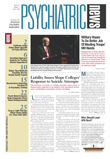Almost half of people in a recent survey reported having little or no knowledge about mental illnesses, but the vast majority—84 percent—believed that they could benefit from this information, according to the results of a survey released by APA in May.
That most of the respondents were interested in learning more about mental health topics is good news to APA's secretary-treasurer and incoming president-elect, Carolyn Robinowitz, M.D.
“The more people learn, the more they can understand what mental illness means for themselves and their friends, family members, and others they know,” she told Psychiatric News. “This knowledge also enables them to seek care for themselves and their loved ones if necessary.”
APA conducted the survey in March among 1,005 participants aged 18 to 54 recruited through Web advertisements by Knowledge Networks, a consumer research firm. The 1,005 respondents were randomly selected from an Internet database of people who agreed to take part in a number of Web-based surveys. They completed the mental health survey online.
APA gathered the information to gain an understanding of public knowledge and attitudes about mental illness, according to Lydia Sermons-Ward, director of APA's Office of Communications and Public Affairs.
The results of the survey also helped shape the messages behind APA's 2006“ Healthy Minds, Healthy Lives” campaign.
According to the results, a third of those surveyed (33 percent) attributed mental illness to an “emotional or personal weakness,” and about the same proportion attributed mental illness to old age. In addition, a third of adults said they would not seek treatment for a mental disorder because they fear what others would think of them.
Those surveyed said they would rely on a variety of sources for information or advice about identifying the basic signs of mental illness. For instance, 82 percent reported being “very likely” or “somewhat likely” to rely on a family doctor or primary care physician for this information, and 73 percent said they would turn to a friend or family member. Slightly less popular sources of information included pamphlets in a doctor's office (71 percent), books (68 percent), and the Internet (60 percent).
When presented with a scenario in which a friend displayed warning signs of a common mental illness, the majority of respondents (85 percent) reported being “very likely” or “somewhat likely” to suggest that the friend seek help from a family doctor or primary care physician.
Though there were a number of misconceptions about mental health revealed in the survey answers, Robinowitz is encouraged by the results, for the most part. “I think that if this survey had been conducted a decade ago, the results would have been more discouraging,” she said. Continuing to publicize the results of treatment and its effectiveness will continue to enhance public awareness about mental health issues, she noted.
The survey results showed respondents need more information about psychiatric treatments: 63 percent of respondents would suggest to a friend that he or she seek help from another friend or family member, and 62 percent would suggest that the friend consult the help of a psychiatrist.
“People with mental illness and their families are the best mental health spokespersons.”
Although the majority of Americans (87 percent) believe that it is important to have a medical degree to be able to diagnose and treat mental illnesses, there was a misconception among many members of the public about whether psychiatrists were medical doctors: 39 percent were unsure or said psychiatrists were not medical doctors.
Though some respondents were negatively impacted by the stigma surrounding mental illness, many others believed that the media could help to erase stigma: about two-thirds of those surveyed said that positive portrayals of people with mental illness in the news or in television shows and movies would have “quite a lot” or “some” influence in overcoming the stigma associated with mental illness.
Psychiatrists can also do their part to educate the public, Robinowitz said.
“We have an obligation to speak about these issues in our communities—in synagogues, churches, schools, and other public settings where we can teach people about mental illness,” she said.
In addition, psychiatrists and psychiatric organizations such as APA should continue to partner with consumer-run organizations such as the National Alliance on Mental Illness, she said, “because people with mental illness and their families are the best mental health spokespersons” and are best able to demythologize mental illnesses and their treatments.
Psychiatrists should also partner with their medical colleagues, according to Robinowitz, because “more than 50 percent of mental health care is provided by primary care physicians, who still carry old stereotypes and misconceptions about mental illness.”
Robinowitz said that through its “Healthy Minds. Healthy Lives Web” site, APA is helping to inform the public with the most accurate and up-to-date information available on mental illnesses and their treatments.
More about APA's 2006 “Healthy Minds. Healthy Lives” campaign is posted on the Web at<www.healthyminds.org>.▪
